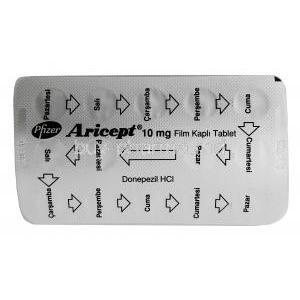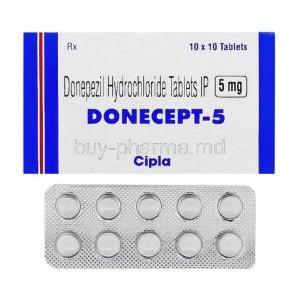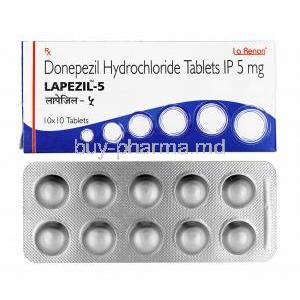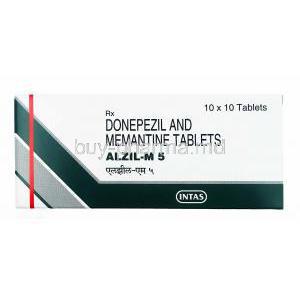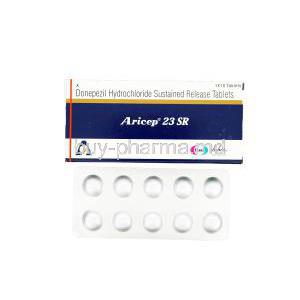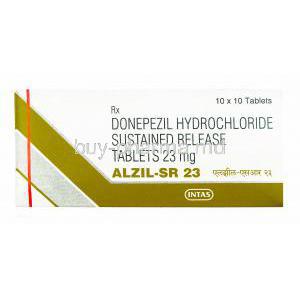Aricept
- I. Introduction
- II. Composition
- III. How It Works
- IV. Uses
- V. Off-Label Use
- VI. Dosage and Administration
- VII. Common Side Effects
- X. Warnings and Contraindications
- XI. Careful Administration
- XII. Important Precautions
- XIII. Administration to Elderly
- XIV. Administration to Pregnant Women and Nursing Mothers
- XV. Administration to Children
- XVI. Overdosage
- XVII. Storage
I. Introduction
Aricept Overview: Aricept, also known as donepezil, is a player in the management of Alzheimer's disease. Acting as a cholinesterase inhibitor, it plays a role in improving cognitive function in patients dealing with this challenging condition. Historical. FDA Approval: The journey of Aricept as a treatment for Alzheimer's began with its development by Eisai and Pfizer, leading to its approval by the FDA in 1996. Since then, it has been a source of optimism for patients and their loved ones.
Significance in Alzheimer’s Treatment: Alzheimer's disease is a neurological disorder that results in memory loss and cognitive decline. Aricept targets these symptoms, providing not only relief but also a glimmer of hope for slowing down the progression of the disease.
II. Composition
Active Components: The key element found in Aricept is donepezil hydrochloride, which acts on and blocks acetylcholinesterase, leading to heightened levels of acetylcholine in the brain.
Inactive Components and Their Functions: Comprised of additives, these components maintain the medication's stability, absorption rate, and overall patient acceptance without providing any therapeutic benefits.
Medication Formulation: Aricept is crafted as oral and rapidly dissolving tablets to meet the varying requirements of individuals at different stages of Alzheimer’s disease.

III. How It Works
Aricept works by blocking the enzyme acetylcholinesterase in the brain, which breaks down acetylcholine. This leads to an increase in the levels of this neurotransmitter. By boosting activity with higher acetylcholine levels, Aricept helps transmit nerve signals essential for memory, cognition, and logical thinking. Patients taking Aricept often notice enhancements in abilities such as memory, focus, and everyday task performance. However, these improvements may vary among individuals are typically moderate, in nature.
IV. Uses
- Aricept is used to treat dementia caused by Alzheimer’s disease. It can help improve attention, memory, behavior, and the ability to perform daily activities in dementia patients. However, it’s essential to note that Aricept is not a cure for Alzheimer’s disease. While it may improve symptoms, the condition will still progress over time, even in people who take this medicine1.
V. Off-Label Use
- Aricept is also used off-label for other conditions, including:
- Dementia with Lewy bodies
- Vascular dementia
- Parkinson’s disease dementia
- Traumatic brain injury
- Mild cognitive impairment
- Attention deficit hyperactivity disorder (ADHD)
- Some initial studies suggest benefits in schizophrenia for addressing cognitive symptoms2.
VI. Dosage and Administration
To effectively manage Alzheimer's disease using Aricept, it is important to follow the recommended dosing instructions.
- The treatment usually begins with a dose and is gradually increased to minimize any potential side effects.
- The dosage can be adjusted based on how the patient responds and tolerates the medication with a maximum limit in place to prevent any negative effects.
- It is also necessary to consider populations, such as those with renal or hepatic impairment, and make dose adjustments accordingly to prevent heightened exposure to the medication.

VII. Common Side Effects
Though Aricept has its advantages, it comes with some drawbacks. Users often experience side effects such as problems like nausea, vomiting, and diarrhea, which are typically temporary as the body gets used to the medication. Additionally, some may also face symptoms like insomnia.
X. Warnings and Contraindications
Hypersensitivity and Allergy Information: Individuals with known hypersensitivity to donepezil hydrochloride or piperidine derivatives should avoid Aricept. Manifestations of allergic reactions include rash, itching, and potentially anaphylaxis.
Conditions That Warrant Caution: Caution is advised in patients with a history of cardiac disease, seizures, or pulmonary conditions. Aricept can exacerbate symptoms or interact unpredictably with existing conditions.
Absolute Contraindications: Aricept is contraindicated in patients with severe liver impairment and in those with a known genetic condition that affects the drug's metabolism.
XI. Careful Administration
- To ensure Aricept is effective and safe its advised to check heart function and assess cognitive performance.
- For those with moderate to kidney or liver issues adjusting the dosage may be needed.
- Prior to starting treatment evaluating kidney and liver function is crucial, for dosing accuracy and avoiding side effects.
XII. Important Precautions
- Use of Aricept in Specific Groups: It's important to be cautious when prescribing Aricept to women, nursing mothers, and children, as there is limited safety information available.
- Precautions during Surgery and Anesthesia: Aricept may interact with anesthetics, so it's crucial to inform the team about the patient's medication before any procedure.
- Guidelines for Effective Usage: Patient and caregiver awareness of the effects of Aricept, possible side effects, and the importance of following the prescribed regimen are vital for its success.
XIII. Administration to Elderly
As people get older they may need to adjust their medication doses to account for the likelihood of negative reactions and other health conditions linked to aging. While Aricept is generally well tolerated by seniors it's important to stay alert and watch out for any side effects in this age group. When using Aricept along with medications, it's crucial to carefully assess potential interactions to prevent harmful effects and maintain effectiveness.
XIV. Administration to Pregnant Women and Nursing Mothers
Assessment of Risks to Fetal Development: Studies on animals have indicated impacts, prompting careful consideration when recommending the use of Aricept during pregnancy. When it comes to breastfeeding, the presence of Aricept in breast milk remains uncertain, highlighting the importance of balancing advantages and risks. It is advisable for mothers and nursing women to look into alternative treatments that offer a safer option.
XV. Administration to Children
Research Status and Discoveries: There is no research on the safety and effectiveness of Aricept in children, so it's best to proceed with caution and conduct a thorough evaluation.
Ethical Approval: It is crucial to involve parents or legal guardians in decision-making processes and ensure informed consent is obtained before any actions are taken.
Appropriate Dosage Forms and Administration Techniques for Children: Special formulations and dosing methods may be necessary if the use of Aricept is considered essential for patients.
XVI. Overdosage
Signs and Symptoms of Overdose: Overdosing may lead to feelings of nausea, vomiting, excessive salivation, low blood pressure, breathing difficulties, and seizures.
Initial Antidotes: Urgent medical attention is crucial, often involving the use of atropine as a remedy to combat effects.
Aftermath of Overdose: Continuous monitoring and supportive measures are vital for facilitating recovery without any enduring consequences.

XVII. Storage
Storage Recommendations: It is advisable to keep Aricept in a cool, dry place at room temperature and away from direct sunlight to maintain its effectiveness.
Importance of Expiration Dates: Patients should be educated on the significance of adhering to expiry dates for ensuring the safety and efficacy of medications.








